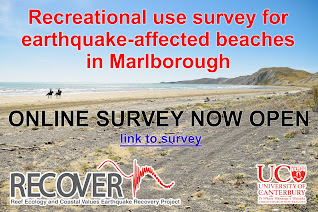 |
| Link to report |
The report responds to a request from Marlborough District Council (MDC) for information on the coastal environment, with a particular focus on supporting the development of a bylaw to address changes in recreational use patterns that have occurred since the Kaikōura earthquake. We present a selection of information from our earthquake recovery research that has a focus on understanding the impacts and ongoing processes of change.
Major impacts of the natural disaster are associated with vertical uplift of the coastal environment, although ongoing erosion and deposition processes are also important. Interactions with human activities are also important because they can exert strong influences on the reassembly of ecosystems which is a critical aspect of outcomes over the longer-term.
Earthquake uplift caused widespread mortality of many coastal habitats and species (e.g., algal assemblages) that are adapted to a relatively specific set of conditions, often associated with characteristic locations in relation to the tidal range. In uplifted areas the intertidal zone has moved seaward leading to a physical widening of many beaches. This has provided greater opportunity for off-road vehicle access to the coast and has become particularly noticeable at headlands and other natural barriers that were previously impassable at high tide. Off-road vehicles pose threats to sensitive vegetation and wildlife unless appropriately managed. Achieving this is assisted by an understanding of the specific impacts of vehicle use, which in turn requires information on the location of sensitive areas.
To ensure the best outcomes for earthquake recovery there is an urgent need to assess and respond to the new spatial patterns, and to make plans to avoid conflicts where possible.





